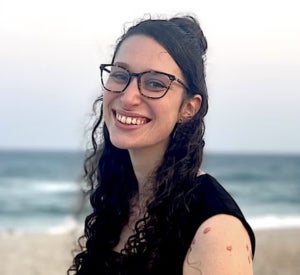
Biography
Emily Goldberg is a trainee in the Center for Neural Basis of Cognition training program. Her primary mentor is Professor Michael Walsh Dickey. Goldberg began her doctoral studies in August 2020 and decided to attend Pitt for the rich research training experiences, the collaborative and supportive environment and to work alongside highly regarded research mentors in her field of interest. Her research characterizes language re-learning in the context of post-stroke aphasia treatment. Specifically, Goldberg is focused on determining the role of post-stroke sleep dysfunction on memory consolidation while individuals with aphasia engage in treatment. This work has allowed her to blend her training in CSD, neuroscience and sleep and circadian science to ask novel, multi-disciplinary and exciting research questions. Immediately after completing her doctoral studies, Goldberg hopes to continue diversifying her research skills in a post-doctoral role. Ultimately, she aims to serve as a faculty member in a CSD department, mentoring and teaching students while continuing her research program.
Education
- Bachelor of Philosophy in Communication Science and Disorders, University of Pittsburgh
- Master of Science in Speech Language Pathology, University of Pittsburgh
Awards
- School of Health and Rehabilitation Sciences Doctoral Award, 2023
- Center for Neural Basis of Cognition Community Collaboration Award, 2023
- Sleep Research Society Small Research Grant, 2023
Research Interests
- Language re-learning in the context of aphasia treatment, with heavy emphasis on the role of sleep-dependent memory consolidation as a person-specific factor impacting patient outcomes.
Publications
- Goldberg, E., Hui, F., Saber Tehrani, A., Evan, J., & Hillis, A.E. (2023). Carotid Stenting Can Improve Contralateral Perfusion and Function. Advances in Neurology and Neuroscience Case Report, 6(2), 219-221.
- Goldberg, E.B., Meier, E.L., Sheppard, S.M., Breining, B.L. & Hillis, A.E. (2021). Stroke recurrence and its relationship with language abilities. Journal of Speech and Language Hearing Research, 64(6).
- Goldberg, E.B., Hula, W.D., Cavanaugh, R., Swiderski, A.M., Autenreith, A., & Dickey, M.W. (In Preparation). Cognitive functions supporting learning over time in n among treatment for aphasia.”
Certificates
- Certificate of Clinical Competence (CCC), American Speech Language Hearing Association
- Licensed Speech Language Pathologist, State of Pennsylvania